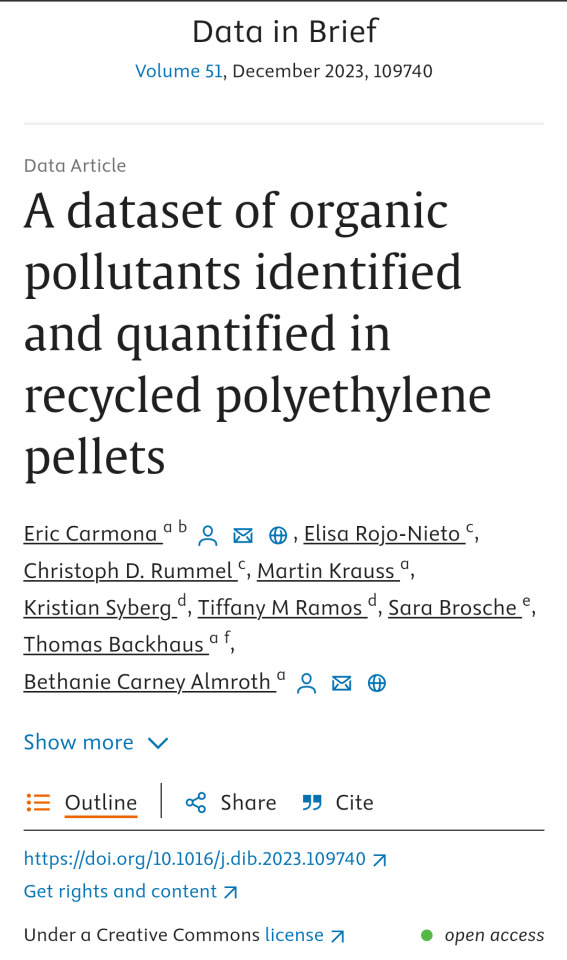#Chemical industry
Explore tagged Tumblr posts
Text
This is the sort of story that tempts me to say, "Fuck it, don't do this anymore because it isn't doing any good. You can post as many stories as you want telling people how their health or the health of their family members is being compromised, but so long as trump and his mafia are in control, it makes no difference."
Excerpt from this New York Times story:
Formaldehyde, the chemical of choice for undertakers and embalmers, is also used in products like furniture and clothes. But it can also cause cancer and severe respiratory problems. So, in 2021, the Environmental Protection Agency began a new effort to regulate it.
The chemicals industry fought back with an intensity that astonished even seasoned agency officials. Its campaign was led by Lynn Dekleva, then a lobbyist at the American Chemistry Council, an industry group that spends millions of dollars on government lobbying.
Dr. Dekleva is now at the E.P.A. in a crucial job: She runs an office that has the authority to approve new chemicals for use. Earlier she spent 32 years at Dupont, the chemical maker, before joining the E.P.A. in the first Trump administration.
Her most recent employer, the chemicals lobbying group, has made reversing the Environmental Protection Agency’s course on formaldehyde a priority and is pushing to abolish a program under which the agency assess the risks of chemicals to human health. In recent weeks it has urged the agency to discard its work on formaldehyde entirely and start from scratch in assessing the risks.
The American Chemistry Council is also seeking to change the agency’s approval process for new chemicals and speed up E.P.A.’s safety reviews. That review process is a key part of Dr. Dekelva’s purview at the agency.
Another former chemistry council lobbyist, Nancy Beck, is back alongside Dr. Dekleva at the E.P.A. in a role regulating existing chemicals. The council’s president, Chris Jahn, told a Senate hearing shortly after the Trump inauguration that his group intended to tackle the “unnecessary regulation” of chemicals in the United States. “A healthy nation, a secure nation, an economically vibrant nation relies on chemistry,” he said.
It is not unusual or unlawful for industry groups to seek to influence public policy in the interest of their member companies. The A.C.C. estimates that products using formaldehyde support more than 1.5 million jobs in the United States.
What has been extraordinary, health and legal experts said, is the extent of the industry’s effort to block the E.P.A.’s scientific work on a chemical long acknowledged as a carcinogen, and how the architect of the effort was back at the agency as a regulator of chemicals. At the same time, the Trump administration has moved to sharply reduce the federal scientific work force.
“They already have a track record of ignoring the science,” said Tracey Woodruff, director of the Program on Reproductive Health and the Environment at the University of California, San Francisco. “Now, they’re in charge of government agencies that decide the rules.”
43 notes
·
View notes
Text

Abandoned Chemical Factory, Rüdersdorf bei Berlin
#photography#architecture#urban exploration#urbex#stairs#stairwell#factory#abandoned#abandoned places#industrial#chemical industry#industrial photography#forgotten places#lost places#derelict#brandenburg#berlin#urbex germany#germany#east germany#ddr#urbexworld#urbexphotography#urbexeurope#urbexplaces#urban explorers#urban photography#urban#decay#urban decay
81 notes
·
View notes
Text

Oceans of fun... right in your own backyard! Ad for the Bakelite Company’s Krene line of products - 1954.
#vintage illustration#vintage advertising#union carbide#the 50s#the 1950s#bakelite#bakelite company#union carbide and carbon company#plastic#plastics#synthetic plastic#chemistry#chemical companies#chemical industry#bakelite plastics#krene
14 notes
·
View notes
Text
The global Industrial Filtration Market is expected to reach USD 47.1billion by 2029 from USD 37.1 billion in 2024 at a CAGR of 4.9% during the forecast period according to a new report by MarketsandMarkets™. The rigorous environmental regulations imposed by governments worldwide require industries to adopt filtration solutions to mitigate pollution and ensure compliance. This regulatory pressure creates a universal demand for filtration technologies across various sectors.
#industrial#industrialization#energy industry#chemical industry#industrial filtration#industrial wastewater treatment#industrial filtration market#filtration#bag filter#filter press#energy#energia#power generation#water treatment plant#wastewatertreatment#wastewater treatment#waste management#zero waste
2 notes
·
View notes
Text

Print advertisement for Dow Chemical Company depicts a holiday scene with a Christmas tree rising from a bustling town square. People surround the tree, as if attending a tree-lighting ceremony. The paragraph below the image describes the meaning behind the title "The Chemistry of Abundance," specifically the jobs and conveniences brought about by the Dow Chemical Company's production of more than three hundred products.
image citation: Dow Chemical Company. “The Chemistry of Abundance,” 1939. Advertisements from the Dow Chemical Historical Collection, Box 7. Science History Institute. Philadelphia.
#chemistry#christmas#christmas tree#advertising#chemical industry#dow chemical company#dow chemical#happy holidays#holiday season#othmeralia
16 notes
·
View notes
Text
Heaps of pharmaceuticals, toxic chemicals found in recycled plastics
The largest class of chemicals found were pesticides, with 162 chemical compounds coming from this category. Second in the list were 89 different pharmaceuticals. Third place went to 65 different industrial chemicals. These were followed by other classes of chemicals including surfactants, stimulants, fragrances, dyes, repellents, corrosion inhibitors, and more. In all, the researchers say that "491 organic compounds were detected and quantified, with an additional 170 compounds tentatively annotated."
Some of these chemicals come from the manufacturing of plastics themselves, while others are introduced during the recycling stage, and still others find their ways into the plastics through the process of adsorption, a process in which atoms of certain substances form a film that adheres to various surfaces. Because of the range of compounds found, the researchers say that they believe recycled plastics are unfit for most uses (...).

Published in Science
#plastic#plastics#recycling#environmental#chemical industry#chemistry#toxic chemicals#pesticides#pharmaceutical#hazard#health#industry#industrial#resin#petrochemical#petroleum#fossil fuels#research#published#peer reviewed#science#organic chemistry#organic chemicals#pollution#plastic pollution#material science#polymers#publication#epidemiology#public health
7 notes
·
View notes
Text
Oxygen scavenger exporter in India | imperialchem
Discover excellence in oilfield chemicals with Imperial Oilfield Chemicals Pvt. Ltd. (ICPL), offering the industry's widest range of high-quality products. Specializing in mud drilling, oil recovery, water treatment, well stimulation, and refining, we provide solutions that meet stringent industry standards. As a leading oxygen scavenger chemical manufacturer and exporter in India, headquartered in Vadodara, ICPL ensures superior quality and reliability in every product.
Trust ICPL for innovative solutions that optimize performance and efficiency across the oilfield sector.
#Oxygen scavenger Chemical in Vadodara#Oxygen scavenger manufacturer in India#Oxygen scavenger exporter in India#petrochemical products#petrochemical industries#oil and gas industry#chemical industry#oil products#corrosion inhibitor#India#drag#reducing agents#oil & gas supply chain#Upstream activities#upstream oil and gas segment#upstream oil and gas industry#crude oil#pour point depressants#oilfield additives#oil recovery
3 notes
·
View notes
Text
Ujjawala Chemical And Fertilizers company in Jaipur, chemical company in Jaipur, pesticides company in jaipur
Ujjawala Chemical & Fertilizers is a Modern Agriculture Company. We develop products and systems to help farmers around the country grow crops while using the best of the inputs efficiently. We believe agriculture inputs have the potential to bring humanity's needs in balance with the resources of our planet. Ujjawala Chemical & Fertilizers was established in 1996, during that time it was one of India's first Bio Fertilizers companies. We offer Plant Nutrients and Crop Protection solutions including Fertiliser, Crop Protection, Bio-pesticides, Specialty Nutrients & Organic fertilizer. Ujjawala always make their farmers happy and our motto is also Ujjwala's Farmer Happy Farmer

2 notes
·
View notes
Text
How Amtrade is Driving Growth in Australian Chemical Companies
In the competitive landscape of chemical companies in Australia, Amtrade International Pty Ltd stands out for its commitment to driving innovation and delivering exceptional solutions. As a leading chemical distributor in the country, Amtrade plays a crucial role in the growth and success of chemical companies. In this essay, we will explore how Amtrade is driving growth in the Australian chemical industry and the key benefits it offers to chemical companies.
Overview of the Australian Chemical Industry
The chemical industry in Australia is a vital sector that contributes significantly to the national economy. It encompasses a wide range of activities, including the manufacturing, distribution, and sale of various chemicals used in different industries such as agriculture, pharmaceuticals, and manufacturing. However, chemical companies in Australia face several challenges, including intense competition, regulatory compliance, and the need for continuous innovation.
Amtrade's Role as a Chemical Distributor
Amtrade International Pty Ltd is a trusted partner for chemical manufacturers and distributors in Australia. With its extensive experience and expertise, Amtrade offers a range of services that help chemical companies streamline their supply chain and drive growth. As a chemical distributor, Amtrade acts as a bridge between manufacturers and end-users, ensuring a smooth and efficient flow of chemicals.
Amtrade's services include sourcing and procurement, warehousing and logistics, technical support, and market intelligence. By leveraging these services, chemical companies can focus on their core competencies while relying on Amtrade to handle the complexities of the supply chain.
Partnership with Chemical Manufacturers
Amtrade International Pty Ltd collaborates closely with chemical manufacturers in Australia to develop strong partnerships. By understanding the unique needs and requirements of manufacturers, Amtrade provides tailored solutions that drive growth and success. These partnerships enable chemical manufacturers to expand their market reach, access new customers, and develop innovative products.
One of the key benefits of partnering with Amtrade is the extensive market knowledge and network that the company brings to the table. With its deep understanding of the Australian market, Amtrade helps chemical manufacturers identify new opportunities and navigate the complexities of the industry. Case studies showcasing successful partnerships demonstrate how Amtrade has helped chemical manufacturers achieve significant growth and market expansion.
Distribution Network and Market Reach
Amtrade International Pty Ltd boasts an extensive distribution network that spans across Australia. This network enables the company to reach customers in remote areas and provide timely delivery of chemicals. By leveraging Amtrade's distribution capabilities, chemical companies can expand their market reach and tap into new customer segments.
Amtrade's distribution network is supported by advanced logistics and warehousing facilities. These facilities ensure the safe and efficient handling of chemicals, adhering to strict quality and safety standards. By partnering with Amtrade, chemical companies can benefit from a reliable and efficient distribution system that enhances their competitiveness in the market.
Product Portfolio and Technical Expertise
Amtrade International Pty Ltd offers a diverse range of chemicals to cater to the needs of various industries. From specialty chemicals to commodity chemicals, Amtrade's product portfolio is extensive and comprehensive. This wide range of chemicals allows chemical companies to find the right solutions for their specific requirements.
In addition to its product portfolio, Amtrade also provides technical expertise and support to chemical companies. With a team of experienced professionals, Amtrade offers technical advice, product recommendations, and troubleshooting assistance. This technical support helps chemical companies develop innovative products, improve their manufacturing processes, and stay ahead of the competition.
Commitment to Quality and Safety
Amtrade International Pty Ltd is committed to maintaining the highest standards of quality and safety in the chemical industry. The company follows strict quality control procedures to ensure that all chemicals meet the required specifications and comply with regulatory standards. Amtrade's commitment to quality and safety is reflected in its certifications and accreditations, which demonstrate its adherence to industry best practices.
Quality and safety are of utmost importance in the chemical industry, as any compromise can have serious consequences. Amtrade understands this and takes every precaution to ensure that its chemicals are safe for use and do not pose any risks to human health or the environment. By partnering with Amtrade, chemical companies can be confident in the quality and safety of the chemicals they source.
Amtrade International Pty Ltd has emerged as a key player in driving growth in the Australian chemical industry. Through its comprehensive range of services, extensive distribution network, and commitment to quality and safety, Amtrade has become a trusted partner for chemical companies in Australia. By partnering with Amtrade, chemical manufacturers and distributors can unlock new opportunities for growth and success in the competitive market.
Contact Amtrade International Pty Ltd today at +61 3 9229 9229 to discuss your chemical supply needs and experience the benefits of partnering with a leading chemical distributor in Australia.
2 notes
·
View notes
Text
White phosphorus (is a highly reactive and dangerous chemical substance. Some of its dangers include:
1. Toxicity: White phosphorus is toxic and can cause severe health issues if it comes into contact with the skin, eyes, or is inhaled. It can lead to chemical burns, organ damage, and even death.
2. Flammability: It is highly flammable and can ignite spontaneously in the presence of air. This makes it a severe fire hazard, and fires involving white phosphorus can be difficult to extinguish.
3. Smoke and Fumes: When white phosphorus burns, it produces a dense, white smoke containing toxic phosphoric acid. Inhaling this smoke can be harmful and even lethal.
4. Environmental Impact: The use of white phosphorus in warfare or industrial processes can result in environmental contamination, harming ecosystems and aquatic life.
5. Legal Restrictions: White phosphorus has been restricted or banned in various contexts, including its use as a weapon, due to its severe humanitarian and environmental impact.
That's what Israel has been using against the Palestinians for years
#chemical hazard#chemical industry#white phosphorus#free palestine#israel palestine conflict#anti israel#israel news
6 notes
·
View notes
Text

2 notes
·
View notes
Text
Excerpt from this story from DeSmog Blog:
Environmental groups are teeing up a legal challenge to new Environmental Protection Agency (EPA) rules on pollution from chemical and plastics plants, citing concerns the EPA relied too heavily on lowball industry estimates as it sized up the risks to people’s health posed by ethylene oxide (EtO), chloroprene, and other toxic air pollution.
The EPA just announced the new rules in April, saying they’re intended to “significantly reduce” dangerous pollution from chemical plants and some plastics plants.
But the Environmental Integrity Project, Earthjustice, Sierra Club, California Communities Against Toxics, Air Alliance Houston, and others filed suit this week in the federal D.C. Circuit Court of Appeals, with attorneys for the groups telling DeSmog they believe the EPA’s rules remain too weak.
“The EPA’s underestimation of the risks posed by chemical facilities puts nearby communities in grave danger,” Earthjustice attorney Deena Tumeh said in a statement announcing the litigation. “By downplaying ethylene oxide emissions, the EPA fails to protect public health adequately.”
When contacted by DeSmog, the EPA declined to comment, citing pending litigation.
Roughly 200 plants, dotted across the country but heavily clustered along the Gulf Coast, are covered by the new rules. Those plants primarily make chemicals and “polymers and resins,” or plastics — and they release dangerous chemicals into the air in the process.
The new rules, years in the making, update Clean Air Act standards on a half dozen pollutants from those plants, including the highly carcinogenic EtO and benzene, chloroprene (used to make the neoprene that’s found in wetsuits), vinyl chloride (which was notoriously burnt off in the East Palestine, Ohio, train derailment), a vinyl chloride precursor known as ethylene dichloride, and 1,3 butadiene (used to make synthetic rubber).
The EPA has said its rule “will provide critical health protections to hundreds of thousands of people living near chemical plants.”
The environmental groups’ lawsuit comes shortly after Denka Performance Elastomers asked the D.C. Circuit to block the rules from going into effect in May. Denka, a Japanese company, alleged that the EPA allowed too little time for the company to slash chloroprene emissions from its LaPlace, Louisiana, operations, giving the company just 90 days, while other chemical manufacturers would be allowed two years to curb their emissions.
Denka’s claims have drawn public support from the state’s governor, Jeff Landry, and Louisiana attorney general Liz Murrill, who also filed a D.C. Circuit challenge, citing concerns that the Denka plant could be shut down.
Back in April, DeSmog first reported on concerns that loopholes in the rules, combined with plans from companies like Koch Industries to expand their operations, could mean Louisiana’s Cancer Alley won’t see a decrease in total toxic air pollution.
A July 16, E&E News investigation found that tightened EPA regulations governing hazardous air pollution from oil refineries – a similar set of rules to the ones covering chemical and plastics plants – successfully tamped down dangerous emissions from most of the 130 refineries reviewed. Dozens of other refineries, however – mostly located in communities of color – saw emissions rise. Troy Abel, a Western Washington University professor of environmental policy, faulted “less stringent rules enforcement in some states versus others.”
This week’s legal challenge to the rules for plastics and chemical plants doesn’t specify what criticisms the groups intend to raise before the court.
But attorneys for environmental groups behind the new lawsuit filed July 16 said that while EPA’s rule marks an improvement in many ways, it also contains some dangerous flaws.
“The basic structure of the rule is good, we just don’t think it runs far enough,” Abel Russ, a senior attorney for the Environmental Integrity Project, told DeSmog.
12 notes
·
View notes
Text

Abandoned Chemical Factory, Rüdersdorf bei Berlin
#photography#architecture#urban exploration#urbex#blackandwhite photography#bnw of our world#bnw planet#black and white#bnwphotography#noir photography#architecture photography#chemical industry#factory#industrial#industrial photography#abandoned places#abandoned#urban decay#decay#derelict#forgotten places#lost places#brandenburg#urbex germany#germany#urbexphotography#urban photography#urban#urban explorers#bnw captures
44 notes
·
View notes
Text

Cellulose plastics are lightweight! Ad for Hercules cellulose products - 1944.
#vintage illustration#vintage advertising#chemistry#chemicals#chemical companies#chemical industry#chemical products#hercules cellulose products#cellulose products#cellulose#hercules powder company#chemical manufacturing companies#plastics#cellulose acetate#cellulose nitrate#hercules incorporated
7 notes
·
View notes
Text
Pioneering Excellence in Soda Ash Solutions Worldwide | palvichemical
Experience innovation and purity with Palvichemical, your premier destination for Soda Ash (Sodium Carbonate). As a leading soda ash exporter in Canada, we deliver global excellence with our high-quality Soda Ash variants, including both Light and Dense. Trust Palvichemical as your reliable partner and Soda ash distributor in Canada, transforming industries and setting new standards for Soda Ash solutions worldwide. We deliver excellence with both Soda Ash Light and Soda Ash Dense variants. Our commitment to quality ensures that you receive top-notch products to meet your industrial needs.
Discover the power of purity with Palvichemical's Soda Ash (Sodium Carbonate).

#Soda Ash (Sodium Carbonate)#Soda Ash Exporter in Canada#Soda Ash Distributor in Canada#Soda Ash Light#Soda Ash Dense#Chemical industry#chemical company#chemical products#Canada#India#detergent#soap#laundry
5 notes
·
View notes